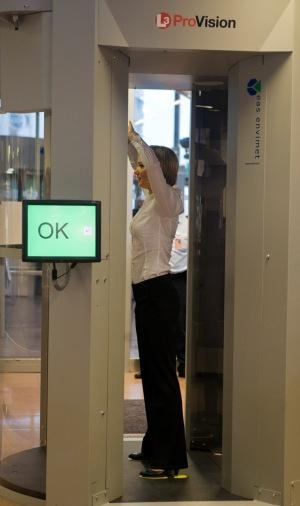Wed, Sep 07, 2011
Interior Minister: Current Generation Of Devices "Not Yet
Suitable For General Use"
The German Interior Minister has decided that full body scanners
are not ready for prime time, and will not deploy the devices at
German airports for the time being. Field testing of two full-body
scanners at Hamburg Airport, which started in September 2010, was
extended once, and was completed on July 31 this year. About
809,000 passengers voluntarily submitted to this method of
inspection for aviation security checks. The internal assessment of
the ten-month test phase has since been completed.
German Ministry Of Interior
Photo

Based on the test results, Federal Minister of the Interior
Hans-Peter Friedrich has decided that, for now, full-body scanners
will not be used at airports. “The Federal Police will
continue to closely monitor developments in this area, and we hope
to have devices soon which both satisfy our high security standards
and are capable of handling large numbers of passengers,” the
Federal Minister said.
Friedrich said in a news release that analysis of the data from
ten months of practical operations showed that full-body scanners
are in principle able to improve the efficiency and effectiveness
of aviation security controls. They are a good way to further
enhance the security of civil aviation, significantly speed up the
inspection process and make it more convenient for passengers in
future.
However, he said, it was also apparent that the technology
is not yet to the stage where the available devices are suitable
for everyday use. Most false alarms can be attributed to clothing
features, such as folds. Even though in many cases follow-up checks
can be limited to the area indicated by the scanner, there are too
many false alarms overall which delay the control process.
For this reason, Friedrich said, the current
generation of body scanners "is not yet suitable for general use,
despite their high rate of detection."
Full-body scanners may currently be used at European airports
only for testing purposes. The European Commission is currently
drafting an EU regulation allowing full-body scanners as a standard
inspection method for passenger security checks.
More News
From 2023 (YouTube Version): Legacy of a Titan Robert (Bob) Anderson Hoover was a fighter pilot, test pilot, flight instructor, and air show superstar. More so, Bob Hoover was an i>[...]
Get The Latest in Aviation News NOW on Instagram Are you on Instagram yet? It's been around for a few years, quietly picking up traction mostly thanks to everybody's new obsession >[...]
Aero Linx: B-52H Stratofortress The B-52H Stratofortress is a long-range, heavy bomber that can perform a variety of missions. The bomber is capable of flying at high subsonic spee>[...]
Altimeter Setting The barometric pressure reading used to adjust a pressure altimeter for variations in existing atmospheric pressure or to the standard altimeter setting (29.92).>[...]
"Knowing that we play an active part in bettering people's lives is extremely rewarding. My team and I are very thankful for the opportunity to be here and to help in any way we ca>[...]
 Classic Aero-TV: Remembering Bob Hoover
Classic Aero-TV: Remembering Bob Hoover ANN FAQ: Follow Us On Instagram!
ANN FAQ: Follow Us On Instagram! ANN's Daily Aero-Linx (05.15.24)
ANN's Daily Aero-Linx (05.15.24) ANN's Daily Aero-Term (05.15.24):Altimeter Setting
ANN's Daily Aero-Term (05.15.24):Altimeter Setting Aero-News: Quote of the Day (05.16.24)
Aero-News: Quote of the Day (05.16.24)



